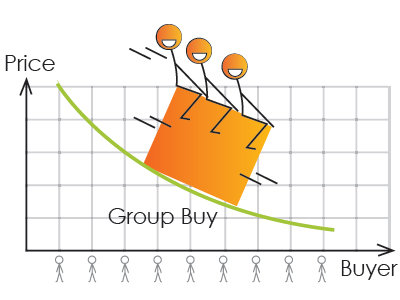
10 Group Buying Challenges
Group Buying is not a new concept even though it has become very popular in internet shopping since the Global Recession of 2008. Groupon & Living Social etc. have popularised this age-old volume leverage technique, but traditional buying groups have existed for decades, helping cooperatives and buying clubs pool their buying requirements to leverage better deals. Purchasing consortia have established themselves as a vital link in today’s world-class supply chain strategies, used as a powerful tool to significantly reduce costs in the most effectively run procurement organisations (not just for SME’s which is a common misconception).
Cooperative commerce facilitating Group Purchasing Organisations (GPOs), has in-fact been around for a hundred years, with the first healthcare GPO established in America in 1910. While the modus operandi has not changed since, with buyers empowered to aggregate their purchasing power and obtain lower prices than they otherwise would be able to get individually.
So the business case for buyers is obvious, with the opportunity to reduce commodity costs directly by 10-20% plus the reduction in time spent sourcing, negotiating and administering individual product/service deals. Suppliers also benefit with the opportunity to reduce their Cost of Sale (& possibly Logistics Costs), while they increase turnover and market share. Manufacturers can often offload excess inventories, while certain suppliers use collective purchasing groups to launch new products on the market (again availing of low customer acquisition costs).
However, the diminishing success of Groupon has highlighted one of the age-old flaws with Group Buying – greed! The value for buyers and suppliers needs to be sustainable, while there should be limited hassle or “friction” for buyers and suppliers to engage in group buying activities.
10 Group Buying Challenges;
- Administration – as hinted above, joining a GPO can be difficult gathering all company, financial and spend data. However, without the data, the opportunity is impossible to define
- Consolidation – as varying product and service data is amalgamated, difficulties arise when negotiating with the buyers to consolidate their specifications and go to market with a limited product/service range
- Quality – as prices decrease, there is a perception that the quality of product/service may diminish also
- Autonomy – buyers like to make decisions and joining a buying group may limit their autonomy in the marketplace thereafter
- Commitment – closing the Intention-Action Gap is a constant task for most GPO’s
, ensuring buyers and suppliers actions align with their initial intentions - Credit Risk – suppliers can struggle with the creditworthiness of buying groups, with the one-to-many relationship leading to a price premium within certain purchasing alliances
- Margin – suppliers need to gain market share at an affordable margin reduction. Similar to greed below, the commercial terms of each GPO need to be sustainable for all parties
- Greed – is the business model viable for the buyer, supplier and GPO?
- Privacy – with multitudes of commercial data being shared within co-ops, between third-parties etc, data privacy is an utmost concern to all stakeholders
- Trust – Trust is the glue that holds all business relationships together, and new GPO’s or members to a group (including new suppliers), suffer with a lack of trust initially
So what other Group Buying Challenges have you met?
With years of experience managing group buying activities via email, spreadsheets & Aspirin!, Arvo have initiated research with Procurement Insights business iDDea and our academic partner UCC, to resolve the above challenges. We are targeting the trust, transparent, bureaucratic and greed flaws of existing buying groups and hope you can join us on this journey…


